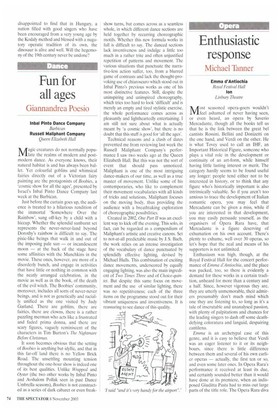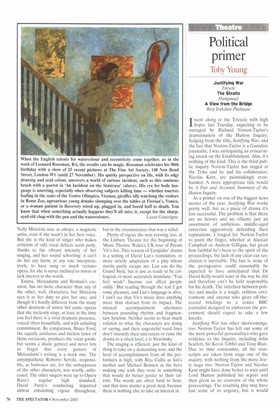Enthusiastic response
Michael Tanner
Emma civAntiochia Royal Festival Hall Ion Linbuty Theatre
Most seasoned opera-goers wouldn't feel ashamed of never having seen, or even heard, an opera by Saverio Mercadante, though all the books tell us that he is the link between the great bel cantists Rossini, Bellini and Donizetti on the one hand, and Verdi on the other. He is what Tovey used to call an IHF, an Important Historical Figure, someone who plays a vital role in the development or continuity of an art-form, while himself having little lasting interest or merit. The category hardly seems to be found useful any longer: people tend either not to be interested in history, or to think that any figure who's historically important is also intrinsically valuable. So if you aren't too anxious to trace the development of Italian romantic opera, you may feel that Mercadante can be given a miss, while if you are interested in that development, you may easily persuade yourself, as the organisers of Opera Rara have, that Mercadante is a figure deserving of exhumation on his own account. There's plenty to exhume, well over 30 operas, so let's hope that the zeal and means of his supporters is not unlimited.
Enthusiasm was high, though, at the Royal Festival Hall for the concert performance of Emma d'Antiochia, and the place was packed, too, so there is evidently a demand for these works in a certain tradition, unheard for more than a century and a half. Since, however vigorous they are, they are utterly unmemorable, their admirers presumably don't much mind which one they are listening to, so long as it's a tale of inscrutable and unanalysed passion, with plenty of palpitations and chances for the leading singers to dash off some deathdefying coloratura and languid, despairing cantilena.
Emma is an archetypal case of this genre, and it is easy to believe that Verdi was an eager listener to it or its neighbours, since there is little difference between them and several of his own earlier operas — actually, the first ten or so, and even some later ones. In Opera Rara's performance it received at least its due, and certainly sounded better than it would have done at its premiere, when an indisposed Giuditta Pasta had to miss out large parts of the title role. The Opera Rara diva Nelly Miricioiu was, as always, a magnetic artist, even if she wasn't in her best voice. But she is the kind of singer who makes criticism of odd vocal defects seem petty, thanks to the vibrant intensity of her singing, and her sound schooling: it can't do her any harm, at any rate interpretatively, to have sung so much verismo opera, for she is never inclined to moon or lack interest in the words.
Emma, Mercadante and Romani's creation, has no more character than any of the other, well, characters, but Miricioiu sees it as her duty to give her one; and though it's hardly different from the many other denizens of minor bel canto operas that she tirelessly sings, at least at the time you feel there is a vivid dramatic presence, voiced often beautifully, and with unfailing commitment. By comparison, Bruce Ford, the equally assiduous and tireless tenor of these occasions, produces the vocal goods, but seems a shade genteel and never lets us forget that every gesture of Mercadante's writing is a stock one. The unsympathetic Roberto Servile, responsible, as baritones are, for the unhappiness of the other characters, was woolly, unfocused. The other singers were up to Opera Rara's regular high standard. David Parry's conducting imparted almost exhausting vigour throughout, but in the circumstances that was a relief.
Plenty of vigour the next evening, too, at the Linbury Theatre for the beginning of Music Theatre Wales's UK tour of Param Vir's Ion. This version of Euripides' drama is a setting of David Lan's translation, or more strictly adaptation of a play whose merits partly escape me. Lan can do the Grand Style, but is just as ready to be colloquial, or more accurately mundane: 'You feel weak? Incense can affect people oddly.' But reading through the text I got some pleasure, and Lan's language is alive. I can't see that Vir's music does anything more than distract from its impact. The musical accompaniment alternates between pounding rhythm and fragmentary lyricism. Neither seems to bear much relation to what the characters are doing or saying, and their ungrateful vocal lines don't intensify their utterances or raise the drama to a ritual level, a la Stravinsky.
The staging is efficient, just the kind of thing to take on a demanding tour, and the level of accomplishment from all the performers is high, with Rita Cullis as Ion's mother and Michael Bennett as the hero making one wish they were in something that would do better justice to their talents. The words are often hard to hear, and that does matter a great deal, because there is nothing else to take an interest in.



































































































 Previous page
Previous page